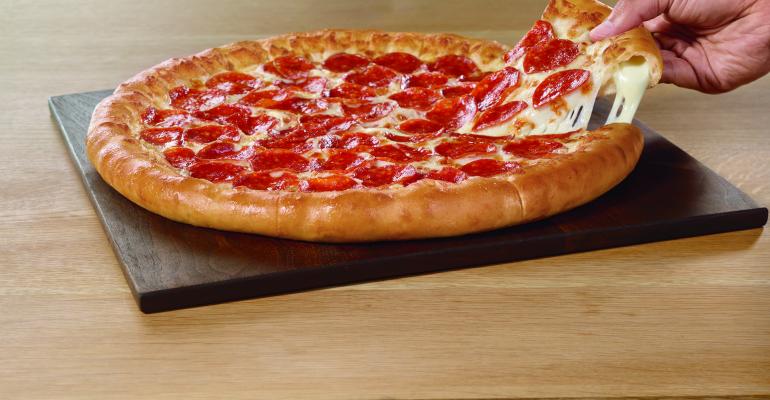During a presentation at Bernstein’s 39th annual Strategic Decisions Conference Thursday, Yum Brands CEO David Gibbs reiterated time and again how his company’s massive global scale creates a significant advantage. One of those advantages comes from the company’s ability to seek out technology companies, acquire them and enable its franchisees to then use those proprietary systems at a reduced cost.
“We’re able to do lot of acquisitions of smaller companies that we can then scale that technology in our system. Our competitors can’t do that because they don’t have the ability to pay the same price for the acquisition and scale it across as many restaurants as we do, so this environment sets up for us to be the leader when it comes to proprietary technology in the restaurant industry,” Gibbs said.
Indeed, this has been the case with Dragontail, which Yum acquired in September 2021. The system leverages AI to automate the kitchen flow and optimize pickup and delivery times. This has also been the case with Kvantum, which Yum acquired in March 2021 to enhance the company’s ability to make “data-driven marketing decisions,” including marketing spend. Essentially, Kvantum develops algorithms and AI models to help brands understand consumer behavior. And, this has been the case with Tictuk, which Yum also acquired in March 2021 to integrate conversational commerce through social media and messaging channels like WhatsApp, SMS and Facebook Messenger.
Executives have shared the benefits of these technologies repeatedly during recent earnings calls and conferences. During Yum’s Q1 earnings call, for instance, CFO Chris Turner said the KFC and Pizza Hut restaurants that have so far implemented Dragontail have experienced consistent “improvements in product quality and customer satisfaction scores.”
“[Customers] are getting hotter, fresher pizzas faster,” he said.
In Q4, Turner said Tictuk’s rollout is proving “it can bring in incremental customers and drive digital sales.”
“This is evidenced by the chat ordering launch in KFC Mexico, where more than 90% of users who transacted on the chat channel had previously not placed a digital order on other channels,” he said.
One of Yum’s acquisitions that hasn’t gotten as much attention – perhaps because it was acquired all the way back in 2015 – is Collider Lab, a consulting firm that provides “culture-based consumer insights.” On Thursday, the spotlight returned to Collider, as Gibbs called it a “proven game changer” for Yum Brands.
“Collider is one of our secrets that we talk about, but people don’t fully get. It was an acquisition of a group of PhDs that study consumer behavior and consumer trends around the world,” Gibbs said. “They can identify where we have gaps and what we’re doing in terms of bringing the brand to life with our marketing programs, redirect the brands, and, as you can imagine, insights and that part of the business, and getting a brand on a slightly different track can make all the difference between success or failure. Collider has been an absolute home run for us.”
What’s next?
So, what’s next, now that Yum has found a strong cadence in tech acquisitions that neatly fold into its giant system? Like many of its peers, this conversation is centered on artificial intelligence and automation.
“There’s lots of change coming and we expect to be on the forefront of that,” he said. “We haven’t talked a lot about robotics and what automation can do, but restaurants are run much more efficiently with the benefit of robotics removing the dirty and dangerous jobs from humans and giving them the more interesting jobs. It’s obviously a big part of this journey.”
Gibbs also called AI a “big positive for the industry,” and believes it could be for Yum specifically, as well. Yum is using AI tech and video, for instance, to confirm order accuracy and improve product quality, and the company is also examining Voice AI.
“It’s not a secret, we process a lot of orders using human beings and their voice. Voice AI in places like the drive-thru and phone orders could have a massive impact on franchisees’ unit economics and the efficiency of our restaurants,” Gibbs said. “AI is going to change how we run our business and all of the changes will be positive for the consumer and very positive for our franchisees and unit economics.”
Contact Alicia Kelso at [email protected]




